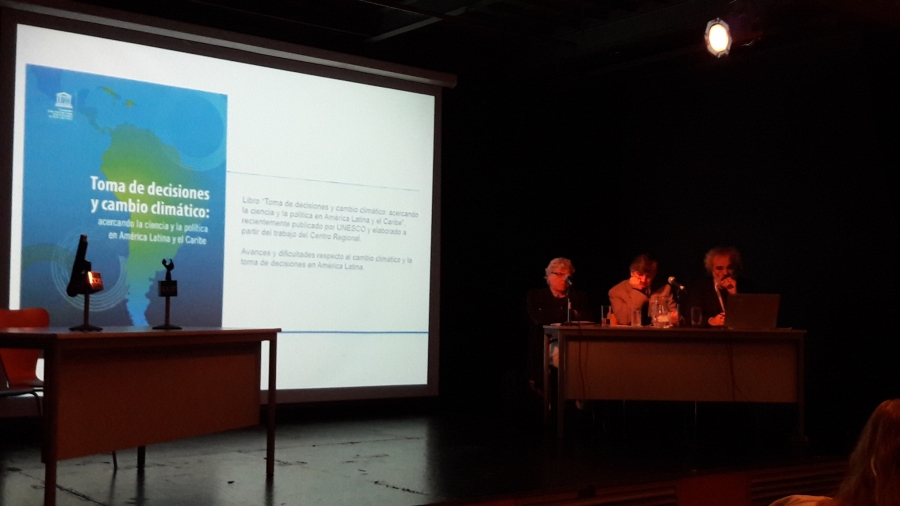Interdisciplinary Congress in Montevideo

The 1st Latin American Congress on Research and Interdisciplinary Higher Education took place in Montevideo, Uruguay on September 2016.
Members of the SARAS Institute spoke about the Management of Water Resources in Uruguay, Advances, Limitations and Challenges. The presentation was based on a study that a large group of researchers carried out. It explores the main challenges faced today in the management of this resource.
At the same time as co-authors of the book Decision Making and Climate Change. Bridging the Gap Between Science and Policy in Latin America and the Caribbean (published in September by UNESCO), the Institute participated in a round table discussion “Challenges Faced to Integrate Climate Change to the Decision Making Processes.” Pedro Jacobi (IEE-USP, Brazil) and Daniel Ryan (ITBA, Argentina) also participated.
Summary of Water Resource Management in Uruguay
Water management in Uruguay faces considerable challenges due to changes occurring in the last 15 years. The most significant changes have to do with the structure of governance, transformation in land use and its effects on ecosystem services, crisis in the drinking water supply, and new irrigation methods aiming to increase production and reduce vulnerabilities under conditions of extreme drought.
Uruguay went from the command-control to integrated management of water resources starting with the last constitutional reform in 2004 and the implementation of a Water Policy in 2009. The latter referred to as Law No. 18.610 identified multiple players acting at three different levels:
- The National Council for Water, Environment and Territory
- The Regional Councils for Water Resources (for three hydrographic regions that cover the whole territory (Uruguay River, Merin Lagoon, and the River Plate and its coast)
- The Watershed Commissions. To this date, there are eight basin commissions within the framework of the three regional councils. All of these include the participation of national and state institutions working in the area of water resources, as well as users, members of the civil society and the academic community.
The transition from one management paradigm to another has coincided with three changes in government. This has implied that the implementation and transformation of the legal framework and norms has suffered inertia and multiple challenges. A list of the main ones follows:
- Predominance of reductionism and Cartesian approaches in experts and politicians with university degrees
- Predominance of uni-sectoral analyses at the government level
- Differences in scale between the dynamics of ecosystems and management systems
- A lack of journalists or news media representatives qualified in environmental issues.
Uruguay is very far from being prepared to implement more modern paradigms such as adaptive management. This is because Uruguay lacks a national program for monitoring the quantity and quality of water. It also is behind in connecting government entities to exchange information being generated, and a will to improve management.
There is lack of information on the current status of many of our existing resources. Therefore, we are unable to evaluate the incidence of different types of land use, the effects of present land-use and management plans, or the incorporation of good practices to the agriculture, livestock or forestry sectors, among other issues.
The study explores and supports a number of strategies for promoting the establishment of an integrated management approach and the transition towards adaptive management models. The most important are the following:
- To improve the dialogue between science, policy and society.
- To improve our understanding of complex problems, not only because of the high level of interdependency of the factors (systemic) and players involved, but also because of the high degree of uncertainty, ambiguity, and existing fragmentation of authority.
- Implementation of a national integrated water monitoring program.
- Inter-institutional cooperation and decentralization for unified monitoring and control programs.
- Mapping of ecosystem services and evaluation.
- Round table discussions for the exchange of scientific and technical knowledge.
- Opportunities to exchange and communicate academic and non-scientific knowledge, incorporation of new methodologies that facilitate the analysis process and participative decision making.
- Evaluation of the current governance system and prepare an agenda in favor of innovation and transformation.
The proposed alternatives seek to promote social learning, to achieve greater adaptability and resilience of the resource and the associated ecosystem services to current and future pressures.
